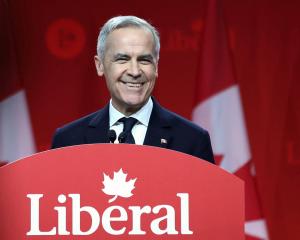Prime Minister John Key and his National-led Government have now been in power for just over 100 days.
To the extent that he and his team promised the electorate to address a number of core issues during the earliest days of their administration and have, by and large, met those commitments, they have earned respect.
Frequently such promises dissipate in the heady mix of power realised, and when it dawns - amid the dark arts of compromise and real politique - that it is one thing to pledge policies and another to deliver.
The progress to date, however, shows a Government with impressive energy and a single-minded focus that belies Mr Key's easy-going manner.
It might also be said that realising its achievements in the face of the worst economic downturn since the Great Depression of the 1930s makes it all the more remarkable.
Or, perhaps not. For it is the Opposition that seems frozen in the headlights of the looming economic juggernaut.
In times of imminent crisis, conventional wisdom requires a degree of national unity and in meeting this expectation the Labour Party in particular has appeared unremarkable.
The news of Helen Clark's application to a top United Nations post and rumours of Michael Cullen's possible early departure cannot have helped.
But it should also be noted that the country seems genuinely to be enjoying the change from the managerialism of Miss Clark to the affability of Mr Key.
This has put Labour Party leader Phil Goff in a difficult position, reflected in the party's terrible recent polls: damned if they do rail against policies, many of which do not differ hugely from their own, and damned if they don't.
Mr Goff also suffers by the closeness of his association with Miss Clark, and a similar personality: a highly competent politician, but lacking the easy charisma of the prime minister.
As to substance, what has been achieved so far has been primarily a dismantling, and a series of proposals - set out in Bills - which will now go forward to select committees.
This is where the work will occur, and it is when the Bills come back to the House for their second readings, and further debate, that the extent to which agendas have been met will be more easily gauged.
Later in the year, with the recession more reality than threat, and with people beginning to suffer consequences, the Government's extended honeymoon may have begun to pall.
It is then that the country might begin to realise the import of the legislative programme and the direction in which it is heading.
There was never going to be any serious difficulty in overturning the Electoral Finance Act, with even Labour recognising its shortcomings.
The challenge will come in drafting a replacement that grapples comprehensively with models of electoral financing, which deals to hidden trusts, and promotes transparency.
Equally, meeting its tax package promises was unproblematic, although examination of where the cuts will impact most - and whether this will help stimulate the economy as much as it might - would bear fruitful scrutiny.
The Resource Management Act has made many enemies, particularly in the business world, and again the likely impact of mooted changes has yet to be fully canvassed.
Economic growth has been touted as the Government's overriding goal in this area and in energy policy, too, and it remains to be seen where the balance between this and the environmental goals promoted by the Labour-led governments of the past decade will lie.
Climate change has been dislodged and sent to the back of the bus, which will delight some and be of concern to others.
The likely success of the Government's law and order initiatives, including proposed changes to the parole system, and the introduction of "boot camps" for the worst of our younger offenders, may be debatable given the record of similar overseas models, but should be given a chance given the problems apparent in past regimes.
The same applies in education with the early introduction of standards for literacy and numeracy, and measures to deal with truancy - although increasing the fines for parents of absent children will surely add only to the total sum of uncollected, and uncollectable monies, owed to the state.
The Government has been able to "tick off" numerous other initiatives.
Many of these have been business-as-usual dressed and promoted as achievments - which if nothing else shows that its spin machine is beginning to whir as smoothly as its predecessor's.
That most intransigent and costly of sectors, health, is a case in point, with much of what has been announced to date - including the sacking of Otago District Health Board chairman Richard Thomson - window dressing.
In more holistic terms, one of the great successes during the Government's early post-electoral period is the manner in which National has achieved accord with the Maori Party, defying much of the commentariat in the process.
Whether such an assiduously courted kinship will survive the rigours of the party's social development policy is yet to be seen, but in this respect as well it can hardly be faulted for effort.













